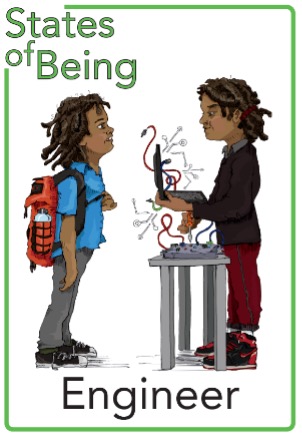Digital Engineer
Intent
A high-quality computing education equips pupils to use computational thinking and creativity to understand and change the world. Computing has deep links with mathematics, science, and design and technology, and provides insights into both natural and artificial systems. The core of computing is computer science, in which pupils are taught the principles of information and computation, how digital systems work, and how to put this knowledge to use through programming. Building on this knowledge and understanding, pupils are equipped to use information technology to create programs, systems and a range of content. Computing also ensures that pupils become digitally literate – able to use, and express themselves and develop their ideas through, information and communication technology – at a level suitable for the future workplace and as active participants in a digital world.
The aims of being a Digital Engineer are:
Understand and apply the fundamental principles and concepts of computer science, including abstraction, logic, algorithms and data representation
Analyse problems in computational terms, and have repeated practical experience of writing computer programs in order to solve such problems
Evaluate and apply information technology, including new or unfamiliar technologies, analytically to solve problems
Become responsible, competent, confident and creative users of information and communication technology.
Implementation
Digital Engineer lessons are taught using the Teach Computing scheme . It is a comprehensive and engaging curriculum designed to develop children’s digital literacy, computer science, and information technology skills. Aligned with the National Curriculum for Computing, it provides a clear progression from Early Years to Year 6, ensuring pupils build confidence and competence in using technology safely and creatively. Through hands-on activities and age-appropriate lessons, children learn key skills such as coding, data handling, and online safety. The scheme also encourages problem-solving, logical thinking, and collaboration—preparing pupils for a digital world both in and beyond the classroom.
What is ‘covered’?
■ Algorithms —Be able to comprehend, design, createand evaluate algorithms
■ Computer networks —Understand how networks can be used to retrieve and share information, and how they come with associated risks
■ Computer systems — Understand what a computer is, and how its constituent parts function together as a whole
■ Creating media — Select and create a range of media including text, images, sounds and video
■ Data and information —Understand how data is stored, organised, and used to represent realworld artefacts and scenarios
■ Design and development —Understand the activities involved in planning, creating, and evaluating computing artefacts
■ Effective use of tools —Use software tools to support computing work
■ Impact of technology —Understand how individuals, systems, and society as a whole interact with computer systems
■ Programming —Create software to allow computers to solve problems
■ Safety and security —Understand risks when using technology, and how to protect individuals and systems
If you want to be a Digital Engineer at home, try looking at these websites with your adult:
- KS1 BBC Bitesize Computing: https://www.bbc.co.uk/bitesize/subjects/zyhbwmn
- KS2 BBC Bitesize Computing: https://www.bbc.co.uk/bitesize/subjects/zvnrq6f
- KS2: https://blockly.games/?lang=en
- Google Interland (KS2 E-Safety game): https://beinternetawesome.withgoogle.com/en_us/interland
- Minecraft coding game: https://code.org/minecraft
- Rapid Router game: https://www.codeforlife.education/rapidrouter/
- Explore the world of Scratch: https://scratch.mit.edu/
Free apps:
Stop motion studio
Beebot
Daisy the dinosaur
Kodable
Hopscotch
ScratchJr
TYNKER
Digital-Engineer-Units-KS1.pdf
Digital-Engineer-Units-KS2.pdf
Digital-Engineer-KS1-Vocabulary.pdf
Digital-Engineer-KS2-Vocabulary.pdf




